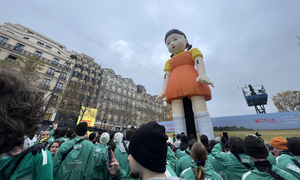As we debate whether we’re in a new Cold War, a recent movie and book about President Ronald Reagan’s legacy have inspired Americans to become more familiar with our 40th president.
From 1981 to 1987, I worked for William Casey, director of the Central Intelligence Agency and manager of Ronald Reagan’s successful 1980 presidential campaign. Casey, who died in 1987, was close to Reagan; both viewed the Soviet Union as an evil empire that had to be defeated.
Indeed, this was a time when the Soviet Union was marching to the tune of the Brezhnev Doctrine: Soviet interference in Vietnam, Angola, Ethiopia, Mozambique, Yemen, Libya, Czechoslovakia, Nicaragua, Grenada and, in 1979, Afghanistan.
Reagan’s instructions to Casey were simple: Defeat the Soviet Union in Afghanistan, halt its meddling abroad, highlight its economic shortcomings and encourage internal liberalization.
National Security Decision Directive (NSDD) 32 of March 1982 said the United States would seek to neutralize Soviet control over Eastern Europe and authorized the use of covert action and other means to support anti-Soviet organizations in the region.
NSDD-75 of January 1983 said the United States should not just coexist with the Soviet Union but change it fundamentally. Casey was an avid anti-communist and took the lead in the implementation of these national security directives, determined to defeat the Soviet Union in Poland, Czechoslovakia, and Afghanistan.
NSDD-166 in 1985 spoke of expelling Soviet forces from Afghanistan, where the Kremlin was spending between $4-$5 billion per year.
With this new directive, efforts to support the Mujahedin increased exponentially and, working primarily with Saudi Arabia, Pakistan and China.
레이건의 정책이 냉전을 끝냈다(1)
조지프 R 디트라니(전 미 대북 6자회담 특사)
우리가 냉전 속에 있는지 여부를 토론하는 가운데 로널드 레이건 대통령의 유산에 관한 최근의 영화와 책은 미국인들이 우리의 40대 대통령과 더욱 친숙해지도록 고무한다.
필자는, 미국 중앙정보국 국장을 지냈고 로널드 레이건의 1980년 성공한 대통령 선거운동의 관리를 담당했던 윌리엄 케이시 밑에서 1981년부터 1987년까지 일했다. 1987년에 작고한 케이시는 레이건의 측근 인사였으며 두 사람은 모두 구소련을 패배시켜야 할 악의 제국으로 보았다.
사실 이때는 구소련이 브레즈네프 독트린에 맞추어 전진하고 있었다. 구소련은 베트남, 앙골라, 에티오피아, 모잠비크, 예멘, 리비아, 체코, 니카라과, 그레나다 및 1979년에는 아프가니스탄에 개입했다.
레이건이 케이시에게 내린 지침은 간단했다. 아프가니스탄에서 구소련을 패배시키고 구소련의 해외 간섭을 중지시키며 구소련의 경제적 결함을 강조하고 내부의 자유화를 장려하라는 것이었다.
1982년 3월의 국가안보결정지침 32호는 미국이 구소련의 동유럽 지배 무효화를 모색하고 그 지역의 반소 단체들을 지원하기 위한 비밀 행동 및 여타 수단의 사용을 허가했다.
1983년 1월에 나온 국가안보결정지침 75호는 미국이 단지 구소련과 공존만 하지 말고 구소련을 근본적으로 변화시키라고 말했다. 열렬한 반공주의자였던 케이시는 이러한 국가안보결정지침의 실행에 앞장서서 폴란드와 체코 및 아프가니스탄에서 구소련을 패배시킬 결의를 다졌다.
1985년의 국가안보결정지침 166호는 크레믈이 매년 40억 내지 50억 달러를 지출하고 있던 아프가니스탄에서 구소련 군대를 몰아낼 것을 언급했다.
이 새로운 지침에 따라 무자헤딘을 지원하는 노력이 급격하게 증가했다. 주된 협력국가는 사우디아라비아, 파키스탄, 중국이었다.
오성환 외신전문위원 suhwo@segye.com △inspire:고무하다 △to the tune of-:-의 가락에 맞추어 △meddle:간섭하다 △highlight:강조하다 △shortcoming:결점 △neutralize:무효화시키다
[ⓒ 세계일보 & Segye.com, 무단전재 및 재배포 금지]
![[설왕설래] 선한 영향력과 악한 영향력](http://img.segye.com/content/image/2024/12/12/128/20241212500643.jpg
)
![[세계포럼] ‘당선인’ 트럼프 곁에 한국이 안 보인다](http://img.segye.com/content/image/2024/03/06/128/20240306519641.jpg
)
![[세계타워] 수사 헤게모니 촌극](http://img.segye.com/content/image/2022/03/16/128/20220316518274.jpg
)
![[기고] 서울 바이오산업의 괄목상대를 기대하며](http://img.segye.com/content/image/2024/12/12/128/20241212500567.jpg
)








